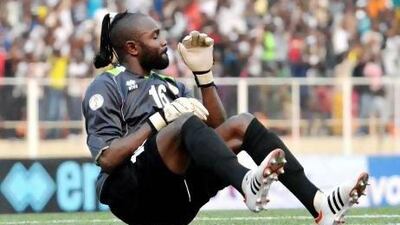Robert Kidiaba's goal celebrations have delighted the 29th African Cup of Nations.
The Democratic Republic of Congo goalkeeper has twice had the opportunity to squat down in his penalty area, fold his knees up to his chest, and, as if clutching the rein of a horse, bounce along the turf on his buttocks, his strong upper thigh muscles creating a peculiar traction.
Those in the South African audiences who have not seen the veteran perform his trick on television before might have wondered whether The Kidiaba Cavort had been borrowing from a move in the YouTube hit, Gangnam Style.
Not so, and anybody who saw his club, Tout-Puissant Mazembe, in action during the 2010 Club World Cup in Abu Dhabi would testify.
The TP Mazembe goalkeeper's creation is an original. He was doing it back then, too.
Kidiaba hopes for a cavort today and that it will signify the goal or goals which could put DR Congo in the quarter-finals.
Victory against Mali would secure their place there. If they gain it, they will thank the keeper for the work he does best, generally from an upright position.
Kidiaba, 36, will always be noticeable, thanks to the long ponytail that sprouts down from the middle of his shaved cranium, but his reflexes have also stood out in the draws against Ghana and Niger so far.
Goalkeepers generally have not been discreet in this Cup of Nations. Two red cards went to keepers in the first week.
Jamel Tassew, of Ethiopia, received his while on a stretcher, having launched himself, like a martial artist, at Zambia's Chisamba Lungu.
Burkina Faso's Abdoulaye Soulama handled outside his area, defending a long ball launching an Ethiopian counter-attack and so he was off.
Mali are still feeling sore that Ghana's custodian Fatawu Dauda was not sent off for handball outside the penalty area in their defeat against the Black Stars. Dauda appeared to be the last defender.
If all that presents an image of ill-disciplined goalkeeping, it would be a wrong one.
There are some erratic goalkeepers here in South Africa - Niger's Kassaly Daouda, particularly, is inspired one minute, ill-positioned the next - but there are also some figureheads, men from whom colleagues draw strength and would-be champions build their game.
Take Zambia's Kennedy Mweene, who takes penalties effectively and is something of a specialist in saving them.
Or there is Nigeria's Vincent Enyeama, who made headlines here in South Africa at the last World Cup for a stunning display to restrict Argentina to a 1-0 win.
The reputation of Boubacar Barry, no giant in physique and once considered the Achilles heel in an enduringly star-studded Ivory Coast line-up, has also grown in the last year or so.
South Africa's Ithumeleng Khune has strikingly valuable modern skill in his high-precision distribution of the ball.
Each of them regularly present strong counter-arguments to an old cliche within the world game that Africa produces a far higher overall standard of outfielders than goalkeepers.
What remains true, though, is that by the export measure - the tendency to evaluate the strength of African countries, or the talent pool of the continent as a whole, by the number of players signed up by clubs in leading leagues in Europe - goalkeepers still rank rather low.
Only one at this tournament, Togo's Kosi Agassa, of French Ligue 1's Reims, is a regular starter at a club in one of Europe's so-called "Big Five" leagues.
This might well say more about the priorities and indeed prejudices of those who scout for talent in Africa.
"I am not sure if people any longer have a generally low opinion of African goalkeepers," said Thomas Nkono, the only goalkeeper to have twice been elected Africa Footballer of the Year. "But I think there was time when maybe people abroad thought in terms of Mwamba Kazadi and one bad World Cup match."
The match concerned was the 9-0 defeat of Kazadi's Zaire at the 1974 World Cup. The poor goalkeeper was substituted during the game.
History now forgets Kazadi had given African goalkeeping rather a good reputation in Zaire's 2-0 defeat against Scotland in the same tournament.
Nkono himself made the leap very successfully to European club football in a time when African stars travelled in far smaller numbers abroad.
He was a doyen of Spain's Espanyol in the 1980s. His great rival, the gifted Cameroon keeper Joseph Antoine Bell, made a similar mark in French football, and captained Marseille, at around the same time.
More recently, Cameroon's Carlos Kameni, now a reserve at Malaga, owned for many seasons the No 1 jersey at Espanyol, and fed off the popularity Nkono once had with fans there.
Curiously, Bell's modern successor at Marseille as keeper and captain is Steve Mandanda, who was born in Zaire (now DR Congo).
He chose to represent France internationally, although his younger brother, Parfait Mandanda, is at this Afcon, in the Congolese squad, but reluctantly playing back-up to the cavorting Kidiaba.
Follow us


